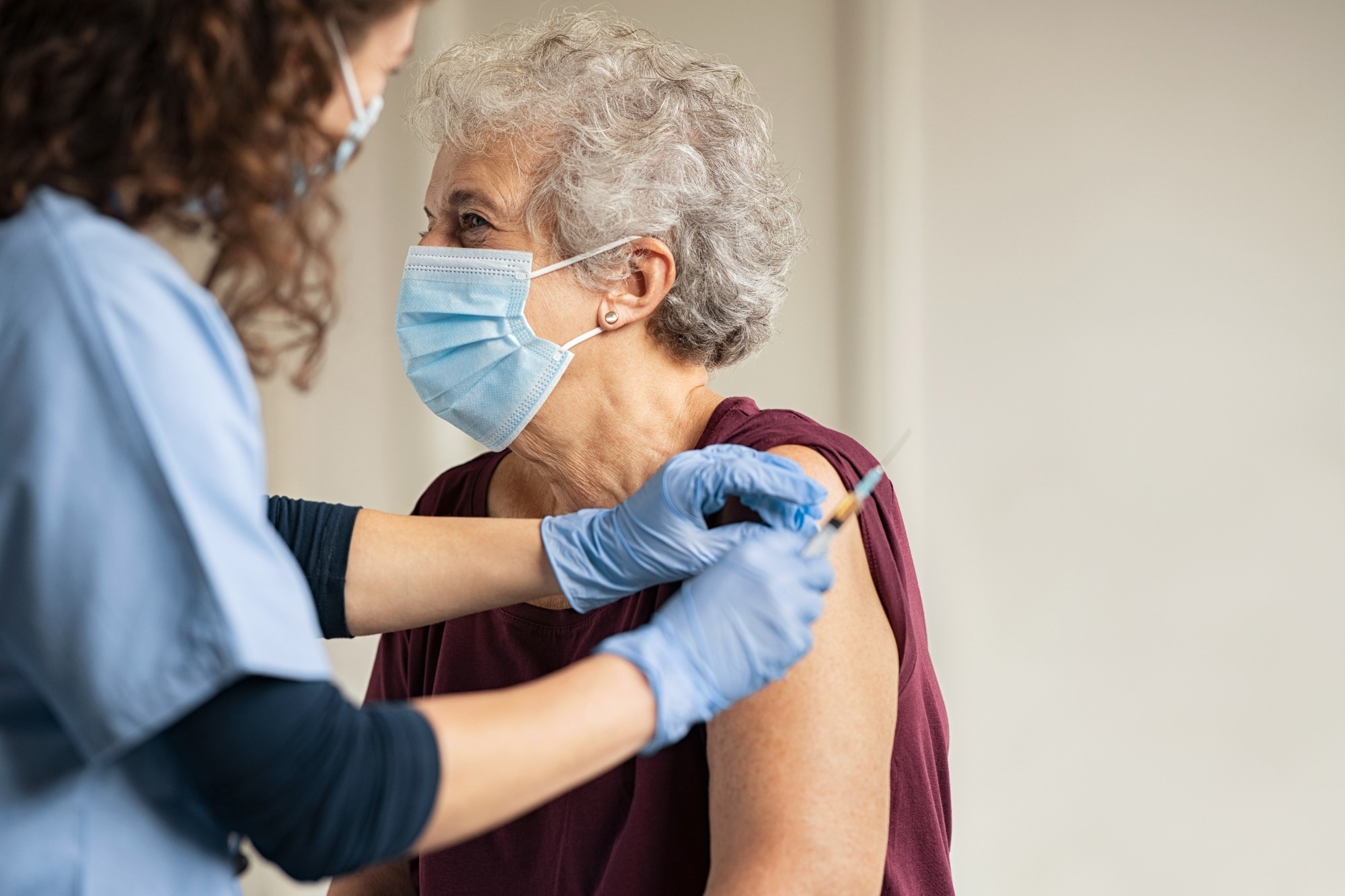New real-world data confirm the RSV vaccine offers strong protection for older adults across two winters, but highlight weaker responses in those with compromised immunity and cardiovascular disease.
 Study: RSV Vaccine Effectiveness Against Hospitalization Among US Adults Aged 60 Years or Older During 2 Seasons. Image credit: Ground Picture/Shutterstock.com
Study: RSV Vaccine Effectiveness Against Hospitalization Among US Adults Aged 60 Years or Older During 2 Seasons. Image credit: Ground Picture/Shutterstock.com
A large-scale multicenter study published in JAMA revealed that a single dose of the respiratory syncytial virus (RSV) vaccine is 58% effective in preventing RSV-related hospitalization among older adults during two viral seasons.
Background
Respiratory syncytial virus (RSV) is a seasonally prevalent virus in the United States, causing epidemics every year in the fall and winter. The virus induces severe respiratory illness and chronic cardiorespiratory conditions in older adults. An estimated 100,000 to 150,000 RSV-related hospitalizations and 4000 to 8000 deaths occur annually among adults aged 60 years or above in the United States.
Three RSV vaccines, including two protein and one mRNA, have been approved and recommended for older adults to prevent severe respiratory illness. In June 2023, a single dose of the RSV vaccine was initially recommended for adults aged 60 years and above. The recommendation was updated in June 2024 for all adults aged 75 years or older and at-risk adults aged 60 to 74 years, and in April 2025 for adults aged 50 to 59 at higher risk of severe RSV infection.
Monitoring RSV vaccines' clinical effectiveness and durability against severe infections and related hospitalization, particularly in high-risk subpopulations, is crucial for public health. Continuous monitoring is also vital to determine whether vaccine effectiveness is declining due to mutation-related changes in viral fitness.
The Investigating Respiratory Viruses in the Acutely Ill (IVY) Network has previously assessed the effectiveness of RSV vaccines in a diverse population during the first season of use. The IVY Network is a multicenter surveillance network that recruits older adults hospitalized with acute respiratory illness in the United States.
The current study was designed to assess the effectiveness of RSV vaccines against hospitalization during two viral seasons among older adults at higher risk of developing severe RSV infections.
Study design
The study population included 6958 adults aged 60 years or above who were hospitalized with acute respiratory illness during two RSV seasons: between October 1, 2023, and March 31, 2024, or October 1, 2024, and April 30, 2025.
Among enrolled participants, 821 (11.8%) were cases (infected only with RSV) and 6137 (88.2%) were controls (tested negative for RSV, SARS-CoV-2, and influenza; human metapneumovirus was allowed, with a sensitivity analysis excluding it). About 7.7% of cases and 15.7% of controls received a single dose of RSV vaccine at least 14 days before illness onset.
The effectiveness of RSV vaccination in preventing RSV-related hospitalization was assessed in the entire study population and was stratified by the interval between vaccine receipt and illness onset.
Key findings
According to the study estimates, a single dose of the RSV vaccine is 58% effective in preventing RSV-related hospitalization among adults aged 60 years or above during two viral seasons compared to no vaccination. The protection against severe outcomes among hospitalized patients was sustained for two years, with a 72% vaccine effectiveness against invasive mechanical ventilation or death.
The estimated vaccine effectiveness was 69% when the vaccine was administered in the same season before illness onset and 48% when vaccination occurred in the prior season. Although point estimates suggested waning, this difference was not statistically significant (P = 0.06).
The estimated vaccine effectiveness during two seasons was 30% among immunocompromised adults, significantly lower than that among immunocompetent adults (67%). A similar reduction in vaccine effectiveness was observed among immunocompetent adults with cardiovascular disease (56%) compared to those without cardiovascular disease (80%).
The effectiveness of the vaccines Arexvy (GSK) and Abrysvo (Pfizer) was similar. They were effective against both RSV A and RSV B subtypes.
Study significance
The study highlights the protective efficacy of a single-dose RSV vaccination against RSV-related hospitalization and severe in-hospital outcomes among older adults during two viral seasons.
The observed reduction in vaccine effectiveness in at-risk subpopulations indicates that older adults with moderate to severe immunocompromising conditions may have lower initial and less durable immune responses to RSV vaccination, highlighting the need for a shorter revaccination interval.
Among older adults with cardiovascular disease, the observed reduction in vaccine effectiveness may be associated with the pro-inflammatory state that diminishes immune responses, contributing to increased susceptibility to RSV infection and potentially inhibiting immune responses after vaccination. Reduced vaccine effectiveness in this subpopulation also highlights the need for a shorter revaccination interval than that for the general older adult population.
Existing evidence on RSV vaccine-specific immune responses suggests that revaccination at intervals ranging from 12 to 36 months after the primary vaccination can boost antibody titers, but not to the same level as after the primary dose. These findings agree with the results of a clinical efficacy trial, which demonstrates that older adults reimmunized with the RSV vaccine 12 months after the primary vaccination do not gain additional protection against RSV-related lower respiratory tract disease compared to no revaccination.
The Advisory Committee on Immunization Practices has recently expanded RSV vaccination to adults aged 50 to 59 who are at higher risk of severe RSV infection. Such reformation of vaccine policy for adults highlights the need for continuous monitoring of vaccine efficacy to accurately characterize waning protection and inform revaccination intervals.
Download your PDF copy now!